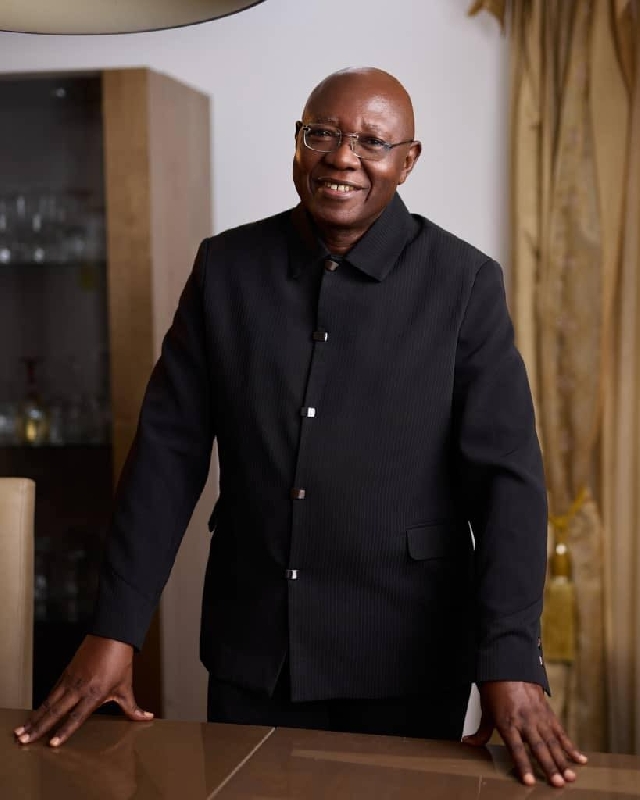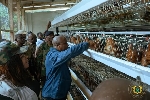The death of patriotism and the rise of perfidy
Feature Article
 Akwasi Opong -Fosu
Akwasi Opong -Fosu
The recent saga involving Eddie Nketiah and Callum Hudson-Odoi offers more than just a football storyline — it is a revealing commentary on how notions of loyalty, patriotism, and national identity are being redefined in our time.
Both players, born to Ghanaian parents, initially declined invitations to play for Ghana, preferring to pursue opportunities with England.
Only when those ambitions faltered did they seek to reconnect with their Ghanaian heritage and join the Black Stars.
Their story is not simply about changing minds.
It symbolises a deeper shift in values that extends far beyond sport — a shift in which national loyalty is treated as a matter of convenience and patriotism is no longer a guiding principle but a tool for personal advancement.
It raises uncomfortable questions about who we are becoming as a people and what we now value as a nation.
Opportunism Over Loyalty
Perfidy, at its core, is betrayal disguised as self-interest — and it is hard not to see elements of that in the actions of these players.
Choosing England was a calculated decision based on visibility, prestige, and career prospects.
That is understandable in a globalised world where talent seeks the biggest stage.
Yet the subsequent attempt to play for Ghana after those ambitions were thwarted casts a shadow over their motives and raises questions about the sincerity of their patriotism.
This is not just about football.
It reflects a broader mindset in which national identity is treated as a strategic asset rather than a sacred bond.
It suggests that belonging is negotiable, that loyalty is conditional, and that patriotism can be set aside when it does not serve personal goals.
This erosion of national pride does not end with sport — it echoes across politics, governance, business, and civil society.
It is therefore gratifying that the coach of the Black Stars has resisted pressure to include these players despite lobbying from some sports journalists.
In doing so, he affirmed an important principle: that national pride and merit must prevail over opportunism, external pressure, and media manipulation.
Patriotism in Decline
True patriotism is more than waving a flag or reciting a national anthem.
It is a sense of duty, a deep commitment to one’s nation even when it demands personal sacrifice.
It is the willingness to stand by one’s country not because it is always rewarding, but because it is home.
The decision by Nketiah and Hudson-Odoi to overlook Ghana until it became useful to them highlights a troubling decline in this sense of duty.
This transactional approach to loyalty is not confined to football.
It mirrors what we see in politics, where individuals shift allegiance based on power and personal gain.
It appears in public service, where the pursuit of contracts and privileges often eclipses the commitment to serve.
It is visible in parts of civil society and the media, where principles bend to the weight of money or influence.
As opportunism rises, patriotism diminishes.
The message this sends to younger generations is corrosive: that loyalty is negotiable and that one’s identity and commitments can be reshaped to suit personal advantage.
When such attitudes become widespread, they weaken the bonds that hold a nation together.
Beyond Football: A National Crisis
The deeper tragedy is that perfidy has become normalised in many spheres of our national life.
Betrayal no longer shocks us; it is often rationalised as pragmatism. Public trust is betrayed by officials who serve personal or partisan interests instead of the common good.
Political loyalty is betrayed by those who sell their convictions for appointments.
Even the vision of nation-building is betrayed when citizens place tribe, party, or self above country.
This normalisation of betrayal undermines the very foundations of our democracy.
It breeds cynicism, weakens institutions, and erodes collective purpose.
It also betrays the sacrifices of our forebears, who fought not for personal gain but for the freedom and dignity of a people.
Their patriotism was not transactional.
It was unconditional.
Reclaiming National Pride
Yet all is not lost.
The decline of patriotism is not inevitable; it is the result of choices — choices we can change. Rebuilding a culture of loyalty and duty requires a deliberate effort across society.
We must start by redefining what we celebrate. A society that rewards only wealth and power, regardless of how they are acquired, will always produce opportunists.
We should instead celebrate integrity, sacrifice, and service. We should honour the teacher, the nurse, the soldier, and the public servant who serve selflessly.
These are the patriots whose work sustains our nation.
We must also strengthen accountability. Betrayal should have consequences. Corruption, disloyalty, and abuse of public trust must be exposed and punished, not rewarded or excused. Only when integrity is consistently rewarded will patriotism regain its rightful place.
Finally, we must invest in educating the next generation about the value of loyalty and service. Patriotism is not blind nationalism; it is an active, everyday commitment to the nation’s well-being. It is paying taxes, protecting public property, rejecting corruption, and speaking truth to power. It is choosing to stand with one’s nation not only when it is easy but especially when it is difficult.
A Call to Renewal
The stories of Eddie Nketiah and Callum Hudson-Odoi should challenge us to reflect deeply, not just on their choices but on what those choices reveal about us. Are we building a society where national identity is cherished or one where it is exploited?
Do we reward loyalty or do we glorify betrayal when it is dressed up as ambition?
We cannot afford to treat patriotism as a relic of the past.
It must once again become a virtue we uphold, teach, and defend. Ghana is not a fallback option or a backup plan. It is a sacred responsibility that demands loyalty, sacrifice, and integrity from all of us — whether on the football pitch, in the halls of power, or in our daily lives.
If we fail to restore this sense of duty, we risk losing not just our pride but the very soul of our nation. But if we rise to the challenge, we can reclaim the spirit of service and sacrifice that built Ghana — and build a future worthy of that name
by Akwasi Opong -Fosu
Source: Classfmonline.com
Trending Features

Stop letting Maths and Science decide Ghana’s future
13:56
President Mahama’s agro-industrial revolution: Turning Ghanaian farms into business powerhouses
12:19
Laud Nartey: Growing unethical behaviour among bank staff- why BoG, GAB must scale up surveillance
07:02
Trapped in a cycle of danger: blood in the recycling factory
12:23
A new Africanism is rising: Why identity matters now
09:26
Kumasi High Court gripped by battle over Daddy Lumba’s widowhood rites
09:13
Drop in WASSCE 2025 performance – Reality check and opportunity for correction?
09:45



